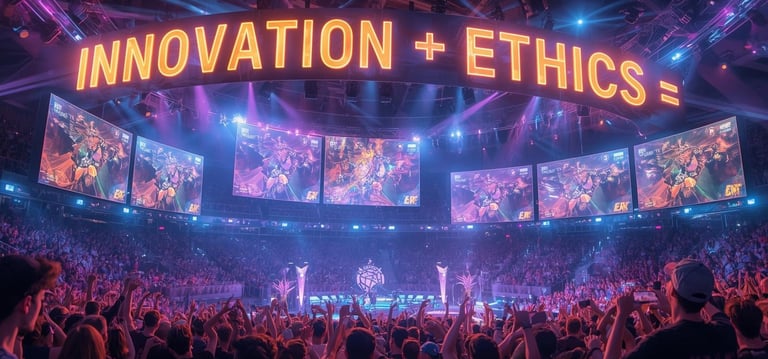Building a Balanced Gaming Era – Human Values & Innovation Together
“Gaming’s Future Lies in Balance: A New Era Where Innovation Meets Human Values.” Part 5
Gajanan L. Bhonde
8/27/202513 min read


Introduction: The Double-Edged Sword of Gaming
Gaming, in its various forms, has emerged as a significant cultural phenomenon that permeates the lives of millions around the globe. It is often seen as a double-edged sword; while it offers numerous benefits, it also raises various concerns. On one hand, gaming can serve as an effective tool for learning and skill development. Educational games, for example, have proven to enhance cognitive abilities and promote critical thinking among players. This aspect of gaming has given rise to gamification, a strategy employed by educators and businesses alike, enhancing engagement through game-like elements.
Moreover, gaming fosters creativity and innovation. Many game design communities encourage collective creativity, allowing players to express themselves through character customization, world-building, and narrative development. These creative endeavors not only entertain but also cultivate problem-solving skills essential in real-world scenarios. Social interaction is another benefit of gaming; multiplayer platforms and online gaming communities enable players to form friendships, collaborate on missions, and share experiences, often transcending geographical barriers.
However, the darker side of gaming cannot be overlooked. Concerns surrounding addiction are prevalent, with excessive gaming leading to detrimental effects on physical and mental health. Individuals may find themselves prioritizing gaming over personal relationships and responsibilities, potentially exacerbating feelings of isolation. Additionally, games that contain violent themes raise ethical questions about their impact on aggression and desensitization to violence in real life.
As we explore the intricate relationship between gaming and human values, it becomes increasingly crucial to navigate its benefits and drawbacks mindfully. By acknowledging both sides of this double-edged sword, we can work towards a future where innovation in the gaming industry aligns with the cultivation of positive human values, ultimately leading to a more balanced gaming era.
The Power and the Peril – Understanding the 50/50 Impact
The gaming landscape is a multifaceted realm that encompasses both significant benefits and notable drawbacks. On one side, gaming has emerged as a powerful tool that can enhance cognitive skills, improve problem-solving abilities, and foster social connections among players. Engaging in various gaming experiences often demands strategic thinking, quick decision-making, and adaptability, which can translate positively into real-world skills. Research has consistently shown that gamers may exhibit improved hand-eye coordination, better spatial awareness, and heightened multitasking capabilities. Moreover, online gaming communities can strengthen social ties, providing platforms for friendship and teamwork that transcend geographical barriers.
However, as we examine the 50/50 dual impact of gaming, it is crucial to consider the potential negative consequences that can arise. One of the more alarming effects of prolonged gaming is the risk of addiction. The immersive nature of many games can lead to excessive playtime, impacting individuals’ daily lives, relationships, and overall mental health. Furthermore, there is an increasing concern regarding the desensitization to violence that can result from exposure to violent video games. Frequent engagement with such content may dulled emotional responses and influence players' perceptions of aggressive behavior in real life. This suggests the need for responsible gaming practices and mindful consumption of gaming content.
Understanding the complexity of gaming's impact on individuals and society involves striking a careful balance. While the enhancements to cognitive skills and the opportunities for social interaction should be recognized, the pitfalls of addiction and aggression-induced behaviors cannot be overlooked. Emphasizing a 50/50 perspective equips stakeholders—from gamers to developers—with the critical insights necessary to navigate the evolving gaming landscape responsibly and ethically.
Human Values as the Compass of Gaming’s Future
As we navigate the rapidly evolving landscape of the gaming industry, the incorporation of human values such as empathy, collaboration, and respect emerges as a fundamental element guiding future developments. By embedding these values into game design and community interactions, developers can create experiences that not only entertain but also foster social good and enhance emotional intelligence among players.
One prominent approach to integrating human values is through cooperative gameplay mechanics. Games that emphasize teamwork and collaboration encourage players to communicate effectively, support one another, and achieve common goals. Titles such as "Overcooked!" and "Keep Talking and Nobody Explodes" exemplify this trend, showcasing how shared challenges can strengthen bonds and promote a spirit of togetherness. By prioritizing collaboration, developers are not just crafting enjoyable gaming experiences; they are also nurturing essential social skills that resonate beyond the digital realm.
Moreover, the power of storytelling in games presents another avenue for promoting empathy and respect. Narrative-driven titles, like "Life is Strange" and "The Last of Us," invite players to step into the shoes of diverse characters facing complex challenges. These narratives encourage players to reflect on their own values and experiences, fostering a deeper understanding of different perspectives and cultures. Games with rich storytelling can influence emotional intelligence, helping players to cultivate compassion and empathy towards others.
Furthermore, initiatives such as inclusive game design and representation in gaming narratives play a pivotal role in shaping a more equitable gaming environment. By ensuring diverse characters and voices are represented, game developers can create spaces where all players feel respected and valued. This not only enhances the gaming experience but also serves as a catalyst for societal change, as players recognize the importance of inclusivity in all aspects of life.
As gaming evolves, the integration of these human values becomes vital in crafting a balanced gaming era. By positioning empathy, collaboration, and respect at the forefront, the industry can lead towards creating a more inclusive and equitable gaming future.
Innovation as the Engine of Progress
Innovation plays a crucial role in the evolution of the gaming industry, driving continuous improvements in technology, design, and player engagement. As gaming becomes more intertwined with technological advancements, developers are harnessing tools such as virtual reality (VR), augmented reality (AR), and artificial intelligence (AI) to create immersive and interactive experiences. These advancements enhance the gaming experience by providing players with environments that are not only visually stunning but also intricately designed to foster engagement and social interaction.
Moreover, player engagement has been significantly enhanced through innovations like cloud gaming platforms, which allow players to access a wide variety of games without the need for expensive hardware. This democratization of gaming expands access, enabling a broader audience to partake in interactive entertainment. Mobile gaming has also seen tremendous growth, propelled by innovative design and functionality that support casual and competitive play alike, thus changing the traditional gaming landscape.
While the advances in the gaming sector are impressive, it is essential that innovation aligns with ethical considerations. Developers must be vigilant in addressing issues such as data privacy, addiction potential, and inclusivity, ensuring that their cutting-edge developments also promote a responsible gaming culture. Ethical innovation encourages developers to reflect on how their creations impact users, urging them to uphold human values such as fairness and respect in their designs.
The balance between leveraging innovative technologies and maintaining ethical practices is essential for fostering a healthy gaming environment. By prioritizing responsible innovation, the gaming industry can evolve not just in terms of graphics and mechanics but also in cultivating a community that values trust and integrity among its players. This holistic approach to advancement positions the gaming landscape for a sustainable future, ensuring that innovation serves to enhance human experience while remaining ethically grounded.
The Role of Parents and Educators
In today’s digital world, the influence of parents and educators is crucial in guiding children through their gaming experiences. Parents play a significant role in monitoring gaming habits and ensuring that the content aligns with their child's values and developmental needs. Engaging in open dialogues about gaming can help in understanding the child’s interests and preferences. It is imperative for parents to familiarize themselves with popular games, their mechanics, and the messages they convey. This knowledge allows them to set appropriate boundaries and foster a balanced approach to gaming.
Additionally, educators have the opportunity to shape the gaming landscape by integrating educational games into their curricula. This not only enhances the learning experience but also models responsible gaming behavior. Teachers can incorporate discussions about game design, encouraging students to think critically about the media they consume. By analyzing various game elements, such as narrative structures and ethical implications, educators can instill analytical skills in young gamers that extend beyond the screen.
To promote healthy gaming habits, parents and educators should collaborate on strategies that emphasize balance and moderation. For instance, establishing designated gaming times can encourage children to engage in a variety of activities, such as outdoor play, reading, and interactive family discussions. Furthermore, fostering critical thinking skills is essential; guiding children to question what they see in games—whether it pertains to character behavior, decision-making, or societal norms—can help them develop a discerning approach to gaming.
In conclusion, the collective efforts of parents and educators are vital in shaping children's gaming experiences positively. By fostering an environment where informed choices, critical discussions, and healthy habits are prioritized, caregivers and mentors can ensure that the influence of gaming enhances the development of essential human values in the next generation.
The Role of Governments and Policy Makers
Governments and policymakers play a crucial role in establishing a balanced gaming culture that emphasizes human values while also fostering innovation in the industry. Through targeted regulations, they can ensure that gaming remains a positive and enriching experience for users of all ages. One significant area of focus is the implementation of age-appropriate content ratings, similar to those utilized in film and television. By mandating clear and accessible age ratings, policymakers help parents make informed decisions about the games suitable for their children, thereby promoting healthy gaming habits.
Moreover, funding educational initiatives is another avenue through which government bodies can contribute to a balanced gaming environment. By investing in programs that teach digital literacy, game design, and coding, policymakers can empower the next generation to harness the potential of gaming as both a hobby and a career. These educational frameworks could encourage young gamers to create content that reflects responsible themes, ultimately enriching the cultural landscape of the gaming community.
Furthermore, effective collaboration between governments and the gaming industry can lead to the creation of policies that prioritize the welfare of gamers while encouraging responsible game development. One noteworthy example is the partnership between various governments and gaming companies to regulate microtransactions and loot boxes, which have often been criticized for their potential to exploit young players. Such initiatives can establish clear guidelines for how in-game purchases are presented, ensuring transparency and fairness.
In conclusion, the proactive involvement of governments and policymakers is essential in nurturing a balanced gaming culture. Through regulations and educational funding, they can ensure that gaming serves as a source of innovation and enjoyment, supporting the welfare of all gamers while promoting responsible practices within the industry.
Children as Innovators, Not Just Consumers
The perception of children as mere consumers within the gaming industry is increasingly being challenged. It is essential to recognize that children also possess the capacity to be innovators in this field. By actively engaging young individuals in the game development process, we empower them to cultivate their creativity and contribute significantly to the evolution of gaming. This shift from consumer to creator underscores the importance of inclusivity in the gaming universe.
Numerous case studies exemplify how children are already driving innovation in gaming. For instance, initiatives like the Game Design Workshops for young developers have emerged, allowing children to collaborate on projects, share ideas, and experiment with various design concepts. These workshops not only enhance their technical skills but also foster teamwork and problem-solving abilities. Through such programs, children can learn to construct narratives, design challenges, and develop gameplay mechanics, transforming from passive players to active participants in the gaming landscape.
Another notable example includes youth-led projects such as the Global Game Jam, where children and teenagers join forces with industry professionals to create video games within a limited timeframe. This platform encourages young innovators to express their visions while receiving mentorship from experienced developers. By participating in such initiatives, children develop a sense of ownership over their creations and gain valuable insights into the game development process.
Moreover, the amplification of digital tools and resources has made it increasingly feasible for children to create their games. Platforms like Scratch and Roblox provide intuitive interfaces that enable young users to build their projects easily. These tools not only democratize game development but also ensure that children's voices are heard in the gaming community. By recognizing children as innovators, rather than just consumers, we can pave the way for a more dynamic and inclusive gaming era.
Ethics + Innovation = Golden Age of Gaming
The intersection of ethics and innovation presents an exciting opportunity for the gaming industry to enter a golden age characterized by responsible practices and creative advancements. As gaming continues to evolve, it is essential for developers and stakeholders to prioritize ethical considerations, ensuring that games provide not just entertainment but also positive social experiences. By integrating ethical standards into the design and development process, the gaming ecosystem can cultivate a more inclusive environment that ultimately benefits all players.
One of the significant advantages of incorporating ethics into game design is the fostering of a healthy gaming culture. Innovations that prioritize player well-being can include features that discourage addictive behaviors, promote mental health awareness, or encourage positive social interactions. Games that align with these values often create supportive communities, enhancing player engagement and satisfaction. For example, projects that enable cooperative play can strengthen social bonds, while narratives that address societal issues can stimulate meaningful discussions among players.
Additionally, ambitious projects that embody ethical innovation often set benchmarks for the industry. Companies that prioritize these principles typically gain a competitive edge, as consumers increasingly favor brands that demonstrate corporate responsibility. This shift encourages other industry players to adopt similar practices, creating a domino effect that elevates the entire gaming landscape. The long-term impact is a more enriched gaming experience, engaging players not only through immersive gameplay but also through meaningful messages and community connections.
In summary, the combination of ethics and innovation is essential for achieving a golden age of gaming. By prioritizing responsible game development and fostering a supportive environment, the industry can significantly enhance player experiences and contribute positively to society. A forward-looking approach that integrates these values will lead to a more sustainable and enjoyable gaming future for all.
Vision of the Balanced Gaming Era
The vision of a balanced gaming era is one where human values seamlessly intertwine with innovative developments in the gaming industry. This ideal landscape is characterized by critical aspects such as accessibility, inclusivity, and a positive social impact. Achieving this balance is not merely a goal but a necessity in an age where gaming continues to evolve rapidly.
First and foremost, accessibility plays a pivotal role in fostering a balanced gaming environment. Designers must prioritize creating games that can be enjoyed by individuals from diverse backgrounds, abilities, and experiences. This entails the development of adaptive technologies, which ensure that gamers with disabilities can participate fully in the gaming experience. By incorporating features such as customizable controls and audio descriptions, the gaming community can foster inclusivity, ensuring no one is left behind.
Inclusivity extends beyond just accessibility; it encompasses representation in game narratives, characters, and development teams. A balanced gaming era must reflect a myriad of voices and experiences, enabling diverse storytelling that resonates with a global audience. This representation not only enhances the gaming experience but also encourages empathy and understanding among players from different walks of life.
Moreover, games have the potential to create a positive social impact by addressing pressing global issues and fostering communication among players. Engaging narratives can spark conversations on critical topics such as mental health, environmental sustainability, and social justice. Thus, the gaming industry should work towards developing content that inspires change while simultaneously entertaining the audience.
In crafting a coherent vision for the balanced gaming era, the industry must actively engage with diverse communities and stakeholders. Through collaboration, ongoing dialogue, and a commitment to evolving practices, the gaming world can become a thriving space where human values and innovation coexist harmoniously, setting a standard for future developments.
Practical Steps to Build This Era
As we endeavor to create a more balanced gaming era, it is crucial for all stakeholders, including developers, educators, parents, and policymakers, to collaboratively adopt actionable steps that promote responsible gaming. This balanced approach can be achieved through a multi-faceted strategy that emphasizes design practices, educational initiatives, and robust community engagement.
Developers play a pivotal role in this transformation. By incorporating ethical design principles, they can ensure that games are not only entertaining but also educational and conducive to positive social interactions. This can include integrating features that encourage empathy, teamwork, and problem-solving. Additionally, leveraging data analytics to identify and mitigate unhealthy gaming behaviors can help create safer virtual environments. Developers should also consider implementing adjustable difficulty levels to accommodate a wider range of player abilities, thus promoting inclusivity.
Educators can significantly contribute to fostering a balanced gaming culture by integrating digital literacy and critical thinking skills in curricula. Programs designed to teach students about the implications of gaming, both positive and negative, can empower them to make informed choices. Workshops and after-school clubs that focus on game design and development can inspire creativity while simultaneously promoting understanding of game mechanics and their impacts on players.
For parents, engagement is key. Establishing open dialogues about gaming habits and setting clear boundaries can facilitate a healthier relationship with video games. This includes monitoring gameplay time and encouraging activities that include physical exercise or communal family gaming sessions which promote cooperation and bonding.
Policymakers have a vital role in shaping the gaming landscape. Crafting policies that encourage responsible gaming practices and protect vulnerable populations is essential. This can involve implementing regulations around in-game purchases or age-appropriate content, as well as supporting initiatives that fund research on gaming effects.
Lastly, fostering community engagement and collaboration amongst players, developers, and parents can enhance societal attitudes toward gaming. Initiatives that bridge gaps between these groups can lead to a more comprehensive understanding of gaming's role in society today.
Conclusion: The Future is in Our Hands
As we stand on the cusp of an evolving gaming landscape, it is imperative to recognize our collective responsibility in shaping this future. The intersection of human values and innovation holds the potential to redefine the gaming experience, ensuring it is not merely a source of entertainment but a catalyst for community-building and personal growth. The gaming industry has witnessed unprecedented advancements in technology, yet it is the human-centric approach that will truly revolutionize our interactions within this realm.
In our journey toward cultivating a balanced gaming era, we must prioritize ethical considerations and inclusivity. Developers, players, and stakeholders alike share the duty to advocate for responsible gaming practices that respect diverse experiences while promoting mental well-being and social connections. Innovators in the gaming sector have the opportunity to create immersive and engaging environments that encourage empathy, learning, and collaboration among players worldwide. By prioritizing these values, we can ensure that gaming grows into a medium that resonates positively with all individuals, regardless of their backgrounds.
We invite you, the gaming community, to partake in this transformative journey. Engage in discussions about ethical gameplay, support developers who emphasize human welfare, and advocate for policies that promote fairness and inclusivity within gaming platforms. The future is in our hands, and through intentional actions, we can build an environment that not only fosters enjoyment but also nurtures respect, understanding, and connection. By working together, we can lead the charge towards a gaming era that reflects the very best of human values while embracing the power of innovation. Let us unite to create a future that benefits every stakeholder in the gaming community, ensuring it becomes a space where everyone can thrive.
















